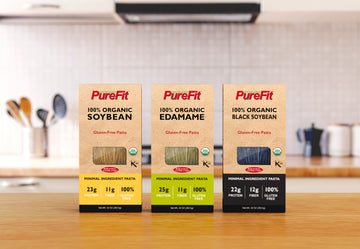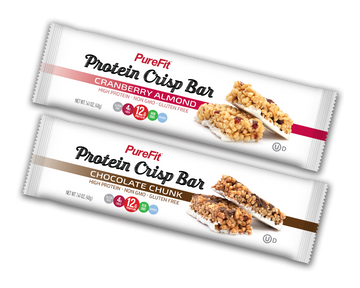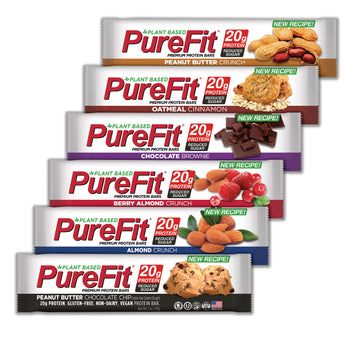
Almost every food has its time in the spotlight as the new “super food” — eggs, milk, coffee, chocolate, red wine and countless others. At any one time, magazine articles, newspaper headlines and TV segments praise a food’s amazing benefits; then a few months later (or sometimes even days or weeks), a completely new set of messages come out proposing the exact opposite.
Now it’s soy’s turn. For years, we heard nothing but positive things about soy’s cancer-fighting, heart-healthy and overall health benefits. Lately, however, word on the street is that some of those healthful claims about soy are overstated, while some are even perpetuating myths like soy does more harm than good.
Myth/Claim #1: Soy can contribute to cancer growth
Soybeans are rich in isoflavones, compounds that are similar to the female hormone estrogen. In some tissues, these substances mimic the action of estrogen, while in others they block the action. Recent studies on the effect of isoflavones are conflicting: Some research suggests they may reduce cancer growth, while others suggest their estrogenic activity could contribute to cancer growth.
A 2008 study in the Nutrition Journal stated that there is little clinical evidence to suggest that isoflavones increase the risk of breast cancer in healthy women or worsen the prognosis of breast cancer patients1. Although a few recent studies have shown that soy may not offer the level of protection against cancer as once thought, other recent studies still suggest that soy plays a protective role against some cancers, including breast, colorectal and prostate cancers2-4.
Bottom line: Moderate intake of dietary soy is safe, though the safety of concentrated soy supplements (e.g., pills, powders) needs further study. The American Cancer Society continues to state on their Web site that eating or drinking soy products is considered safe for those who aren’t allergic to soy, and notes that using soy foods as a substitute for some servings of animal protein is one way to reduce red meat and animal fat intake. Nancy Clark, M.S., R.D., author of Nancy Clark’s Sports Nutrition Guidebook, notes “just don’t expect the soy alternative to taste like red meat. That is, don’t expect the soy burger to taste like a hamburger.”
Myth/Claim #2: Soy has no positive effect on cardiovascular health
After a careful review of human studies, in 1999 the FDA gave permission for manufacturers to include a claim on their food labels that a daily intake of 25 grams of soy protein may reduce heart disease risk. Today, the degree of soy’s positive effect on heart health has come into question.
A recent study reviewed the findings in a majority of 22 randomized trials in which isolated soy protein with isolflavones (compared with milk or other proteins) decreased LDL cholesterol on average by just 3%, down from an earlier study’s findings of 12.9%.5,6 Although the more recent study showed a less significant effect on cholesterol, it still concluded that soy’s fiber, vitamins, minerals and low content of saturated fat can benefit cardiovascular and overall health. In addition, a 2005 study concluded that soy protein can reduce blood pressure and may help prevent and treat hypertension, a leading risk factor for heart disease.7
Bottom line: Although the current research shows that soy may not protect against heart disease at the level once believed, it’s still a healthy source of protein, fiber, minerals and is a great alternative to red meat — the Harvard School of Public Health’s Nutrition Source Web site suggests two to four servings per week to replace red meat.
Myth/Claim #3: Soy decreases fertility and testosterone in men
The effect of soy on men’s fertility came into question in a 2008 study that showed a decrease in sperm concentration — but not motility, morphology or ejaculate volume, which indicate sperm quality — in men who ate soy compared to those who did not8. The most significant effect was found in men who were overweight or who had a higher concentration of sperm to begin with. According to the National Infertility Association, the normal range for sperm is between 40 million and 300 million per milliliter, and counts of 20 million are considered healthy if morphology and motility are normal.
In the 2008 study, the reduction on average was 35 million, which still leaves a well-above-average sperm count for those at the top of the range who showed the most significant reduction. An earlier study in which healthy volunteers took a supplement containing 40 mg of isoflavones daily for two months also showed no effect on semen quality.9
There have been several studies on soy’s effect on testosterone, offering varying conclusions, including two recent studies on purified isoflavones and soy foods in men’s diets that found no significant changes in testosterone levels.10,11 A recent analysis of 29 trials and 32 treatment groups found no significant effects of soy protein or isoflavone intake on testosterone levels.12 Based on this latest analysis, there doesn’t appear to be any cause for concern for men who enjoy a few servings of soy foods each week.
Bottom line: The 2008 study that showed a decrease in sperm concentration was most pronounced in men who had a higher-than-average sperm count to begin with and it showed no decrease in sperm quality. As for soy reducing testosterone in men, there’s simply not enough current evidence that shows this to be the case.
Moderation is the key
Though the degree to which soy may protect against particular diseases may have come into question lately, soy continues to be an excellent source of protein as part of a balanced diet. Soy is a complete protein, rich in vitamins and minerals, and is a great, low-fat alternative to red meat.
As author Nancy Clark suggests, you should enjoy soy as a quick-and-easy, cook-free protein source that takes on the wonderful taste of native cuisines, such as in Chinese stir-fries or Indian curries. Or, more easily, enjoy soy milk with breakfast cereal or a soy-containing nutrition bar before or after a workout. PureFit nutrition bars are 100% All-Natural Ingredients, containing 18 Grams of Soy Protein, Non-GMO Soy, with Unprecedented Great Taste.
References
1. Messina M, Wood C. Soy isoflavones, estrogen therapy, and breast cancer risk: analysis and commentary. Nutr J. 2008 Jun 3;7:17.
2. Yang G, Shu XO, Li H, Chow WH, Cai H, Zhang X, Gao YT, Zheng W. Prospective cohort study of soy food intake and colorectal cancer risk in women. Am J Clin Nutr. 2009 Feb;89(2):577-83.
3. Lakshman M, Xu L, Ananthanarayanan V, Cooper J, Takimoto CH, Helenowski I, Pelling JC, Bergan RC. Dietary genistein inhibits metastasis of human prostate cancer in mice. Cancer Res. 2008 Mar 15;68(6):2024-32.
4. Badger TM, Ronis MJ, Simmen RC, Simmen FA. Soy protein isolate and protection against cancer. J Am Coll Nutr. 2005 Apr;24(2):146S-149S.
5. Sacks FM, Lichtenstein A, Van Horn L, Harris W, Kris-Etherton P, Winston M; American Heart Association Nutrition Committee. Soy protein, isoflavones, and cardiovascular health: an American Heart Association Science Advisory for professionals from the Nutrition Committee. Circulation. 2006 Feb 21;113(7):1034-44.
6. Anderson JW, Johnstone BM, Cook-Newell ME. Meta-analysis of the effects of soy protein intake on serum lipids. N Engl J Med. 1995;333:276-82.
7. He J, Gu D, Wu X, Chen J, Duan X, Chen J, Whelton PK. Effect of soybean protein on blood pressure: a randomized, controlled trial. Ann Intern Med. 2005;143(1):1-9.
8. Chavarro JE, Toth TL, Sadio SM, Hauser R. Soy food and isoflavone intake in relation to semen quality parameters among men from an infertility clinic. Hum Reprod. 2008 Nov;23(11):2584-90.
9. Mitchell JH, Cawood E, Kinniburgh D, Provan A, Collins AR, Irvine DS. Effect of a phytoestrogen food supplement on reproductive health in normal males. Clin Sci (Lond). 2001 Jun;100(6):613-8.
10. Kumar NB, Krischer JP, Allen K, Riccardi D, Besterman-Dahan K, Salup R, Kang L, Xu P, Pow-Sang J. A Phase II randomized, placebo-controlled clinical trial of purified isoflavones in modulating steroid hormones in men diagnosed with localized prostate cancer. Nutr Cancer. 2007;59(2):163-8.




